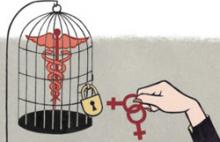The author reports no financial relationships relevant to this article.
CASE 1: Refusal to treat—is it legal?
Two lesbians in South Carolina, together for 7 years, seek insemination services from their HMO gynecology service. The doctors at that service decline to inseminate them—saying that they do not offer this service to lesbians because they believe that only heterosexual, married women should have children—and refer them to another physician outside the HMO. The couple pays $8,000 out of pocket to conceive their son. Because it is legal to discriminate against homosexuals in South Carolina, the doctors cannot be sued, and ACOG cannot discipline the doctors.
Currently, 25% to 45% of clinics in the United States report that they refuse to inseminate lesbians.1,2 What can we do to end such discrimination?
“Physicians and other health care professionals have the duty to refer patients in a timely manner to other providers if they do not feel that they can in conscience provide the standard reproductive services that their patients request.” So says Committee Opinion #385 of the American College of Obstetricians and Gynecologists (ACOG).3 This formal opinion implies that a physician who objects to same-sex couples may refer a lesbian patient to another physician for insemination, thereby communicating his or her discrimination to the patient.
In addition, ACOG’s Committee on Underserved Women released Committee Opinion #428, endorsing “equitable treatment for lesbians and their families, not only for direct health care needs but also for indirect health care issues; this should include the same legal protections afforded married couples.”4 The opinion does not endorse access to civil marriage, per se.
And although ACOG includes a nondiscrimination clause in its Code of Professional Ethics stating that the “principle of justice requires strict avoidance of discrimination on the basis of race, color, religion, national origin, or any other basis that would constitute illegal discrimination,” sexual orientation and gender identity are not specified.
To remain consistent with its mission of “advancing women’s health,” ACOG must include sexual orientation and gender identity in its nondiscrimination statement and endorse access for same-sex couples to civil marriage—not just “equitable treatment.”
In 44 states, laws mandating so-called equitable treatment deny the families of lesbian couples the legal and financial protections of civil marriage that are deemed essential to the health of families headed by heterosexual couples.
In 30 states, ACOG’s nondiscrimination policy, as written, could be interpreted to permit gynecologists to discriminate on the basis of sexual orientation in their practices.
The American Society for Reproductive Medicine issued a statement affirming that there is no justification for denying same-sex couples assisted reproductive technologies.5
Both the American Academy of Pediatrics (AAP) and the American Psychiatric Association (APA) prohibit discrimination on the basis of sexual orientation and endorse civil marriage for same-sex couples in richly evidence-based policy statements. Both organizations affirm that:
- homosexuality is natural, immutable, and noncontagious
- the children of homosexual parents develop with outcomes equal to those of heterosexual parents
- the families of same-sex couples need the same protections that their heterosexual counterparts enjoy.
The American Medical Association (AMA) issued policy statements prohibiting discrimination based on sexual orientation and gender identity because of documented health disparities that arise from discrimination.
In this article, I present evidence to support these positions; provide examples of how the current ACOG statement contributes to disparities; and challenge ACOG to clarify the wording of its opinions.
There is no scientific rationale for any discrimination against same-sex families. There is abundant scientific evidence that these families are harmed by discriminatory laws and treatment.
Civil unions, domestic partnerships do not equal civil marriage
ACOG Committee Opinion #428 makes it clear that “equitable treatment” does not affect religious rules about marriage ceremonies: Marriage licenses must be solemnized either in a religious ceremony performed by a clergy member, or in a civil ceremony performed by a judge, justice of the peace, or elected official.4 The Committee Opinion recognizes that domestic partnerships and civil unions do not provide the same rights as a state civil marriage license, and notes that neither is portable to all other states or recognized by the United States government.4


